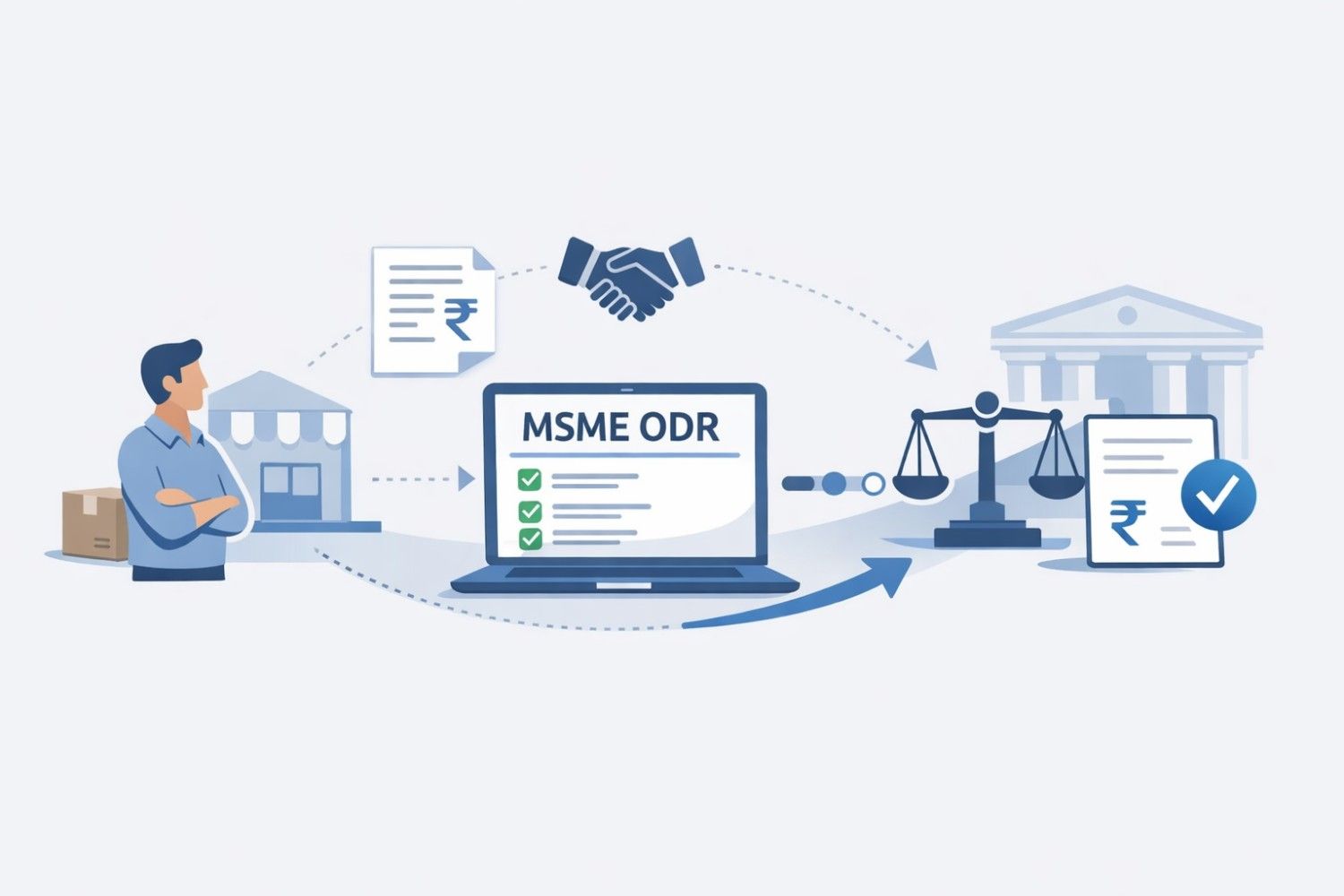Vendor vs Service Agreement: What’s the Difference and Why It Matters?
By the SolvLegal Team
Published on: Oct. 4, 2025, 1:44 p.m.

Vendor vs Service Agreement: What’s the Difference and Why It Matters
In every business, from a growing startup to an established corporation, contracts define relationships, protect interests, and prevent confusion. Among the most common yet misunderstood business contracts are the Vendor Agreement and the Service Agreement. Although both sound similar, they differ in purpose, scope, and legal impact. Choosing the wrong one can expose your business to disputes, delayed deliveries, payment issues, or even tax complications. Understanding this difference isn’t just legal housekeeping it’s a foundation for timely delivery, smooth transactions, and stronger business partnerships.
What Is a Vendor Agreement?
A Vendor Agreement is a contract between a buyer and a seller for the supply of goods or tangible materials. It defines the terms of purchase, delivery schedules, product specifications, and warranty obligations. When your business purchases items like office equipment, raw materials, or packaging supplies, you are entering into a vendor relationship. The Vendor Agreement ensures that the vendor delivers the promised goods on time and that those goods meet the quality standards agreed upon.
A good vendor agreement should cover the product details and quality standards, specific delivery timelines ensuring timely delivery, payment terms including schedule and mode, ownership transfer conditions, warranty obligations, and indemnity or liability clauses. For example, imagine your startup orders 1,000 printed boxes for an upcoming product launch. A vendor agreement specifies not just the price and deadline but also the quality of paper, printing finish, and color standards. If the vendor fails to deliver on time or produces substandard boxes, you can enforce the terms of the agreement to recover losses or terminate the contract.
In India, such agreements are governed by the Indian Contract Act, 1872, and the Sale of Goods Act, 1930, which together provide the legal framework for goods-based transactions.
What Is a Service Agreement?
A Service Agreement, by contrast, governs the performance of work, professional expertise, or intangible services. Here, no tangible goods are exchanged. Instead, the focus is on skill, performance, and accountability. This agreement is typically used when hiring consultants, agencies, or professionals. It ensures that the service provider understands their deliverables, deadlines, and obligations toward confidentiality and quality.
A strong service agreement should clearly define the scope of work, project timelines, performance standards, confidentiality obligations, intellectual property ownership, and termination conditions. For example, if your company hires a digital marketing agency to manage online campaigns, a service agreement would set out content delivery timelines, reporting requirements, confidentiality terms, and ownership of creative materials. The Indian Contract Act, 1872 governs these agreements, supported by other sectoral laws like the Information Technology Act, 2000 and intellectual property laws, depending on the nature of the service.
Key Differences Between Vendor and Service Agreements
While both documents protect the interests of two parties entering into a business relationship, they differ in focus and intent. A Vendor Agreement deals with what is delivered i.e. physical products, goods, or materials. A Service Agreement focuses on how something is done i.e performance, timelines, and results.
The nature of work differs, as vendor agreements handle the sale or supply of goods while service agreements cover tasks or performance. Ownership and risk also differ. In vendor contracts, ownership transfers from the seller to the buyer, whereas in service contracts, ownership doesn’t apply, though intellectual property created may transfer. Quality assurance in vendor agreements relies on specifications and inspection, while service agreements depend on performance standards and outcomes. Vendor agreements fall under the Sale of Goods Act, 1930, while service agreements are governed solely by the Indian Contract Act, 1872. Remedies for breach also vary. Vendors may be required to replace or refund defective goods, while service providers face penalties, non-payment, or termination for poor performance. Payment triggers are another difference. Vendor payments are tied to delivery or invoice, while service payments often link to milestones or completion of specific phases.
Understanding these distinctions helps ensure your contract aligns with the actual nature of your business engagement.
Why Choosing the Right Agreement Matters
Using the wrong agreement type is one of the most common legal oversights among small businesses and startups. It can lead to complications when disputes arise. A vendor agreement that mistakenly governs a service engagement might not include essential clauses on performance, confidentiality, or intellectual property. Conversely, using a service agreement for goods might ignore warranty or delivery obligations.
This confusion can become costly. For instance, a startup purchasing hardware under a service contract may find itself unable to enforce warranty claims when products fail. Similarly, if a business hires a marketing firm under a vendor agreement, it might lose ownership of the creative material due to missing IP clauses. The right contract not only ensures timely delivery and payment discipline but also strengthens your legal position if disputes arise. It clarifies risk, ownership, and accountability, leaving little room for misunderstanding.
Timely Delivery and Payment Terms
No matter the type of agreement, timely delivery and clear payment terms are at the heart of every successful business relationship. In vendor agreements, delivery schedules ensure materials arrive before production delays occur. Including a delivery clause with specific dates and penalties for delays is essential. Many businesses add a liquidated damages clause, such as a percentage deduction from the invoice for each week of delay.
In service agreements, delivery takes the form of project completion or milestones. Payments are often linked to these milestones, ensuring the service provider performs as expected before receiving full compensation. This structure encourages accountability and consistent performance. Payment terms must also specify the mode, due dates, advance requirements, and late payment interest. Clear terms prevent disputes, maintain trust, and help manage cash flow, which is crucial for small and medium businesses.
Legal and Compliance Aspects to Consider
Every contract in India must comply with the Indian Stamp Act, ensuring it is properly stamped to be legally admissible. For high-value vendor and service agreements, stamping requirements vary by state. Additionally, both contracts should include confidentiality clauses or NDAs, especially where proprietary data is shared. Termination provisions are also necessary, outlining how either party can end the relationship. Indemnity clauses protect each side from the other’s negligence or breach, while dispute resolution mechanisms such as arbitration or mediation allow for quicker settlements. Including these clauses ensures enforceability, fairness, and operational continuity, reducing the chances of expensive litigation.
Quality Assurance and Dispute Resolution
Both vendor and service agreements must define what quality means in measurable terms. For vendors, it could mean goods that meet industry standards or inspection reports confirming compliance. For service providers, quality can mean meeting performance metrics, accuracy rates, or turnaround times. Dispute resolution clauses are equally important. They prevent disagreements from escalating into lawsuits by offering structured resolution methods. Most modern contracts in India now include an arbitration clause, allowing disputes to be resolved privately and efficiently rather than through lengthy court processes.
Conclusion
The distinction between a vendor agreement and a service agreement might seem technical, but it shapes how businesses operate every single day. The right agreement brings clarity, accountability, and protection, while the wrong one can lead to confusion, disputes, or financial loss. A vendor agreement ensures goods are delivered on time, in the right condition, and at agreed prices. A service agreement ensures tasks are completed with the promised quality, confidentiality, and professionalism.
For founders, entrepreneurs, and corporate managers, understanding this difference is an investment in stability. At SolvLegal, we help businesses draft, review, and negotiate contracts that safeguard interests, ensure compliance, and foster trust so you can focus on growth, not legal risks.
FAQs: Vendor vs Service Agreement
1. What is the key difference between a vendor agreement and a service agreement?
A vendor agreement governs the supply of goods or products, while a service agreement governs the performance of services or tasks. The first deals with tangible items, and the second deals with expertise or effort.
2. Can one contract include both goods and services?
Yes. A Master Service Agreement can include both, with separate annexures for goods and service components. This approach is useful for complex business relationships involving installation, support, or maintenance along with supply.
3. How important is timely delivery in vendor contracts?
Timely delivery is crucial. Delays can halt business operations, so contracts should specify delivery dates and penalties for missed timelines.
4. Are service agreements legally binding?
Yes. Service agreements are enforceable under the Indian Contract Act, 1872. They must include clear offer, acceptance, consideration, and lawful purpose to be valid.
5. What should payment terms include?
Payment terms should specify when, how, and under what conditions payments will be made. Linking payments to delivery confirmation or milestone completion is ideal for maintaining accountability.
6. How can I ensure quality assurance in vendor and service contracts?
Include inspection rights in vendor agreements and performance benchmarks or service levels in service agreements. These act as measurable standards in case of disputes.
7. Why should businesses seek professional help when drafting contracts?
Contracts are legally binding documents. Expert legal review ensures they’re enforceable, compliant, and tailored to your business risks. At SolvLegal, we customize agreements to ensure your business remains protected and compliant.
ABOUT THE AUTHOR
This blog is authored by Shridansh Tripathi, a second-year law student at the Department of Legal Studies and Research, Barkatullah University, Bhopal.
REVIEWED BY
This article was reviewed by Akhil Singh, a corporate lawyer with expertise in intellectual property rights, contract drafting, and compliance advisory. He is a tech-forward legal practitioner at SolvLegal, where he focuses on corporate compliance and data-privacy frameworks. His experience includes IT law and cross-border regulatory issues, and he assists businesses in safeguarding their innovations while strengthening their overall legal and compliance systems.
DISCLAIMER
The information provided in this article is for general educational purposes and does not constitute legal advice. Readers are encouraged to seek professional counsel before acting on any information herein. SolvLegal and the author disclaims any liability arising from reliance on this content.





